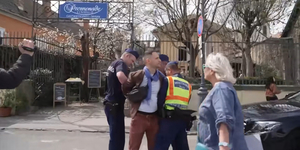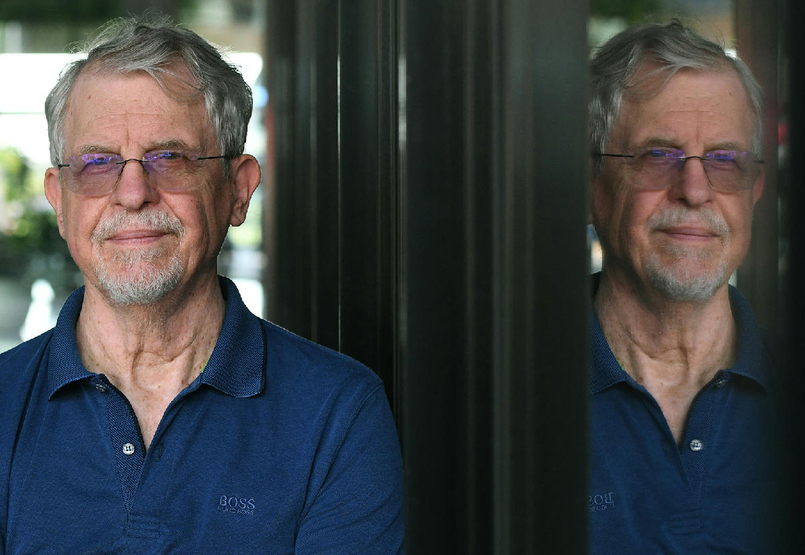On not getting on - Romania and Hungary
A Romanian film won the Palme d'Or at last year's Cannes Film Festival. Something's happening in our neighbour's cultural life which has attracted the whole of Europe's attention. But what do we know of this in Hungary? Why do we still have prejudices about Romania? Something is missing from our picture. And the same goes for Romanians' views of Hungary. hvg.hu spoke to Boroka Paraszka, editor of a newspaper in Marosvasarhely (Targa Mures) in Romania.
You recently did a tour of four countries with young Romanian writers. The venture was financed by a Romanian government cultural fund and organised by a Hungarian editor. It looks from here as if Romania is very effective at representing its culture in Europe. How do they do it, and why?
Boroka Paraszka: Partly, they are forced to. Romania's image is not very good, even if it has changed recently. The old, post-communist inheritance - the saddest of all the barracks - all this has to be overcome. And now there is the new conflict with Europe over the Romanian diaspora, the migrants and the guest workers.
Has this got worse with EU accession or did things get easier?
B. P.: Europe still doesn't recognise that it shares some of the responsibility for the social misery in the East, for the fact that there is a crowd pushing in at the gates that wants work and bread.
But it wouldn't hurt for some parts of Romanian society to accept that there is a problem before they start provoking pogroms against themselves in Milan, Madrid or anywhere else. That's why Romania has started an intensive programme of cultural diplomacy. There's another, internal reason. While Hungary's cultural elite was a loser of the regime change, becoming divided and insecure, in Romania, they found their way into the political elite. They built up their political connections very tactically, managing to make cultural life a kind of strategic industry.
Didn't this lead to corruption?
B. P.: There were compromises, but they were of a different nature. The fundamental strategy was to create a new elite for Romanian society. A young elite. This wasn't about their age, but about the process of creating an unprecedented way of thinking. A clean slate was needed.
And so the new cultural elite couldn't easily be corrupted. Their defence is that they belong nowhere, that they produce work of the highest quality. That they are truly an elite. There is training for the cultural elite. There are elite publishers, there is an elite culture - and they have links to the West.
Is the money flowing to Romania as well?
B. P.: I have indirect knowledge of Romania's cultural foundations via the foundation that supports the Marosvasarhely weekly A Het [The Week], but it seems to me that the funds have a huge amount of money. As far as the promotion of literature is concerned, it's not just the fact that they give bursaries to some writers. There is a translation industry. The aim is to make sure our writers appear in as many languages as possible, in the best places and at the highest quality.
So the money flows into culture, and it's not the politicians and the paymasters who say what should happen?
B. P.: Plenty of money must be spent irresponsibly in Romania as well. I can't really see what the Romanian Cultural Institute in Hungary is doing. It's possible that this is because Romania is looking more towards the West. But there are attaches and institutes and people in charge in Szeged and Pest. They are appointed and they have a budget.
But if all the money is spent, there is still enough. Because, as I said, culture is of strategic importance in Romania. And Romania has borrowed a lot from Hungary in the way it runs its cultural institutions. Romania's cultural fund was modelled on Hungary's - it has the same activities and structure. And as the fight against corruption is a big issue in Romania at the moment, monitoring has become very strict. There is personal responsibility, accountability and both institutions and people monitor each other.
These efforts have borne fruit. Romanian culture is fashionable in Europe. Contemporary music, film and plastic arts from Romania are successful exports.
B. P.: Perhaps excessively so. Romania's film lobby is too effective and the films are not that good. They repeat themselves. The international hits of the moment would have been more timely 10 years ago. But the great success of cultural diplomacy has been to introduce slightly tired old films into the European consciousness, and it is managing to sell them.
Is Hungarian-language culture in Romania also benefiting?
B. P.: I don't know if thjere is such a thing as contemporary Transylvanian Hungarian culture. Hungary's cultural policy has a big role to play in this. In the first period, after the regime change, it was all about preserving our culture in Transylvania, about surviving and sustaining old traditions. Afterwards it was about creating a universal, cross-border Hungarian culture - not distinguishing Hungarian culture in Transylvania and in Hungary itself. That's over now, but nobody has really thought about the fact that we live in different countries. We should be taking part in cultural exchanges, and if there is such a thing as Transylvanian Hungarian culture, then perhaps we should be thinking abuot integrating it into an eastern European network. Things are different in Slovakia, and it would be interesting to establish why. It's also true that Romanians aren't discovering Hungarian culture. They've been translating the same three or four authors for 20 years. There is little knowledge of it. This is an area where Hungarian-Romanian institutions cuold make a difference. But where are they? In 2007, Sibiu was the cultural capital of Europe. Hungary's offering was very weak, and contemporary culture was almost wholly absent. These are major failings. And the reason for them is the assumption that we live in different worlds and have nothing to offer each other.
Things might be different in Slovakia because the elite is open. Take Ilona Nemeth, who was Artist of the Year in Slovakia, representing her country at the Venice Biennale. Could that happen in Romania?
B. P.: I could say that Romania's elite is indifferent and closed - but you have to take a look at the quality of Transylvanian Hungarian culture.
What can we offer? There is some cooperation in plastic arts. But literature is a closed box to which nobody has the key. There is virtually no literary translation between the Romanian and the Hungarian, and this is an enormous loss. But Romania's cultural policy elite could be persuaded to give money for this purpose. Not for high, abstract ideals, but out of simple self-interest. It seems to me that the thinking on this issue hasn't a changed a bit in 15 years. It's suspect. We only seem to be able to think in conflicts. Several authors were taken on a tour of four countries. Big names, barely known in Hungary, like Radu Pavel Gheo, Filip Florian and Dan Lungu.
Bear in mind that a Romanian writer was recently the Czech Republic's writer of the year. We discussed social issues in Vienna, Prague and Bratislava. But the Budapest evening was like marriage guidance. What were we doing with each other? What should we talk about? How? It was successful, but not without tension. The joke is that in the end it emerged that there was no conflict: nobody knew why we were scared of each other.
Pecs will be Europe's cultural capital in 2010, like Sibiu last year. What did that year bring to Romanian culture?
B. P.: The Romanian ministry of culture made a huge effort. They really focused, putting everything else to one side. Cultural activities really benefitted. It was a kind of rehearsal for us, seeing how we could put to use our successes in western Europe.
So there are some intelligent strategies. But a government can go over the top. And it can end up helping out its friends.
B. P.: It sounds strange, but Romania's domestic political crisis is helping us, culturally. The various camps are fighting each other, there's a lot of fluctuation, so there isn't enough time for people to make use of their personal contacts. But there is a common interest in institutions working effectively, making sure, for example, that the Romanian ambassador to Rome has two writers next to him when he has to explain what Romanian homeless people are doing in the city's parks - showing that we are civilised people. It's essential to have cultural weapons at our disposal.
What about you? You've been present in the Hungarian media with your works on Transylvania and Romania - though many think your name must be a pseudonym.
B. P.: Yes, they think it's a pseudonym for the editor of Magyar Narancs.
It's a simple story - I had lots of pseudonyms at one time, like many in Transylvania, the idea being that the name should be untranslateable. But the point is that the Hungarian press has little coverage of foreign affairs, so I'm glad that I have an opportunity to be published. And Transylvania policy is so obsessed with one single issue, that it's welcome that my writings can highlight some other issues. Here, it's all about Marko versus Tokes, about Rosia Montana, about signs in Hungarian, autonomy, etc. But they don't discuss what's happening in the country. The eastern part of Hungary is starting to get involved with Romania and vice versa. There are things happening to which the Hungarian media is paying no attention.
You appeared with a different voice. People treat you with suspicion in Romania. Here as well?
B. P.: In Hungary, what I do would be completely natural. But I work in a Transylvanian Hungarian media sphere where developments lag what we've seen in Hungary - the media's language is less autonomous, less original - and so my writings have generated a strange responce.
Although I wasn't doing anything unusual. What I'm doing would not be unusual in Hungary or in the more daring parts of the Romanian press.
Are you widely read?
B. P.: It changes, because we are somewhat partisan. People know there are issues we will jump on. That's when our readership grows. That didn't happen with the European Parliament elections, because we consciously kept away from the issue, not feeling that it was a social issue.
There's nothing to analyse, no alternatives, so we kept away. We have endless arguments in the office about how much we should write about public affairs. Increasingly, we think we shouldn't get involved. If there is a clear opinion to be expressed, we give space to it, but otherwise we leave politics to itself. We want to help cultural exchange, because we think it is much more important.
But you've published some fairly provocative articles. No longer?
B. P.: It depends what's going to happen. I think things are moving towards consolidation. The Romanian Hungarian ghetto is grinding itself down.
It's not going to be interesting for much longer. Four years ago there was a need for strong criticism of the RMDSZ, because the RMDSZ was strong. But it's not strong any more, and it's recognised it has to limit itself.
Gergely Nagy


















